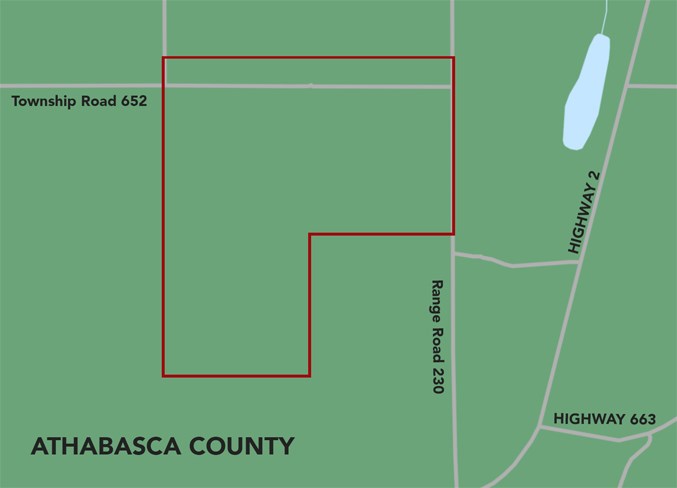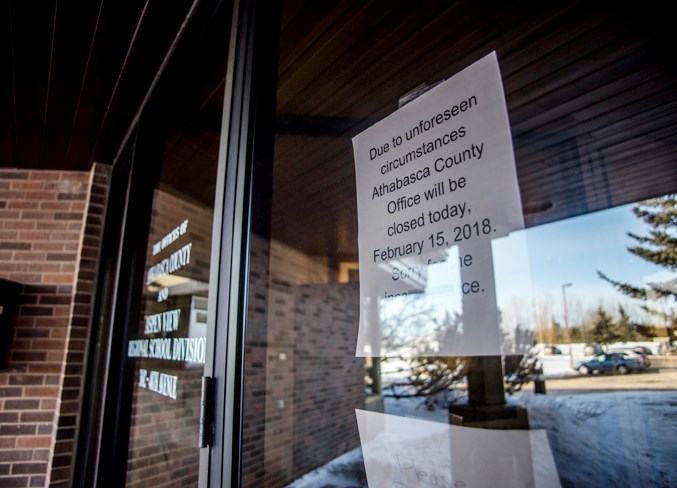Athabasca County will be paying $300,000 to Canada’s Environmental Damages Fund after they damaged 2.5 hectares of the Meanook National Wildlife Area during unauthorized road construction in 2017.
Appearing in Athabasca Provincial Court June 10, defence lawyer Anthony Purgas said the county pleaded guilty to conducting commercial or industrial activity in a wildlife area.
Speaking with county manager Ryan Maier at his side, Purgas said it was an “unrepeatable mistake” that was not malicious, but a confusion of permits.
“I’m sure the residents will not be very happy about this,” Judge John Maher said about the public dollars going into the fine.
Five other charges were dismissed relating to destroying or molesting animals or carcasses, nests or eggs in a wildlife area.
In determining the fine, federal Crown prosecutor Dawn Poskocil said the county had caused persistent damage, had been intentionally reckless and failed to take reasonable steps.
“The penalty must be more than a slap on the wrist,” Poskocil said.
A press release from Athabasca County states the sentencing order recommends “all or part of the fine be paid to Athabasca University” for purposes related to protecting, conserving or restoring the environment. Poskocil noted Athabasca University had PhD programs focused on environmental conservation.
Purgas said the county had been in communication with Athabasca University to make sure the funds would be going back into the area.
“While Athabasca County regrets this incident and the impact to its taxpayers, we are pleased the funds will be able to be directed to Athabasca University for its ongoing environmental research in the region,” states a press release from Athabasca County issued June 12.
Poskocil said the minimum fine for the charge was $100,000, and the county release stated the maximum fine was $4,000,000 for each day that the construction occurred.
The facts
According to the agreed statement of facts read by federal Crown prosecutor Dawn Poskocil, Athabasca County council approved a road construction project July 18, 2017 to improve a half-mile section of road in the Meanook National Wildlife Area.
"The section of road had deteriorated substantially and was a source of concern for local citizens," the statement reads.
 A map showing the Meanook National Wildlife Area.
A map showing the Meanook National Wildlife Area.
The federal government has permitted the University of Alberta to conduct research activities on the land since 1983. The statement of facts says their license did not give them authority to permit Athabasca County to do road construction.
The statement continues that on July 13, 2017, the U of A’s real estate services director emailed then county infrastructure services director Travis Wierenga with names and contact information for two people at the Canadian Wildlife Service at Environmental Canada and Climate Change.
The email was acknowledged, and the U of A’s property manager sent a further email Aug. 10, 2017 stating “we assume you are getting whatever approvals are necessary. Our U of A contact for the site mentioned the Canadian Wildlife Services and the migratory bird legislation in effect in that area in regard to the brushing.”
The statement reads that the county entered into an agreement with the U of A to obtain five metres of allowance on either side of the road for the purposes of brushing and back sloping associated with road construction.
The statement also notes the county obtained land titles certificates that listed the lands as property of Her Majesty the Queen in Right of Canada.
“Athabasca County did not apply for a CWS permit and no permit from the CWS was issued to Athabasca County to engage in road construction activity during the relevant time,” it states.
From Aug. 24 to Sept. 27, 2017, Athabasca County personnel worked on the roads. The agreed statement of facts states that they impacted 2.5 hectares of land driving vehicles; moving soil; removing trees, fences and signage; and lighting fires to burn felled trees.
“One area of felled trees included a bat monitoring station installed in a tree that was never located,” the statement reads, also noting the county took additional fill material from the area surrounding the road within the Meanook wildlife area.
ECCC arrived on site Sept. 27 and issued an Environmental Protection Compliance Order on Oct. 3 to cease construction.
“This activity caused damage to wildlife habitat and risk to wildlife,” ECCC spokesperson Edmund Park said in an email.
Investigation and laying charges
A search warrant was executed on the Athabasca County administration office Feb. 15, 2018 as part of a federal investigation into the charges.
A county press release issued June 12 states that the investigation took more than a year, with charges being laid March 12, 2019.
“Athabasca County has accepted full responsibility for its actions from the beginning,” the statement reads. “The County took steps to get an agreement with the leaseholder, University of Alberta, but did not obtain the required permit from the Federal government in order to proceed onto the federally protected lands during the construction project.
“This was a mistake made during the pre-construction process, and once realized, Athabasca County took all steps to rectify the mistake and cooperated fully with federal authorities throughout the investigation,” it continues.
It also states that Environment Canada ordered remediation of the site, and the county complied fully, completing the required work in the fall of 2018.



